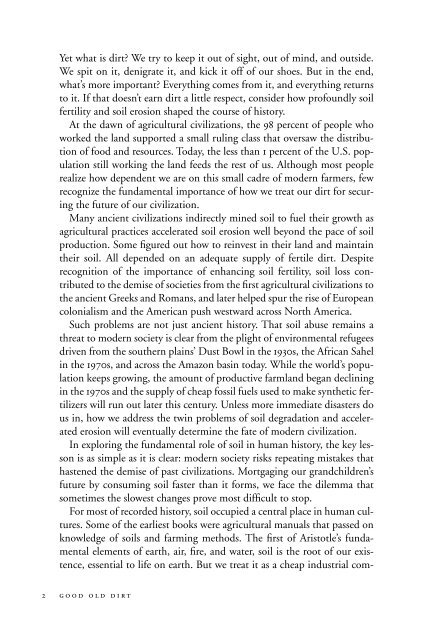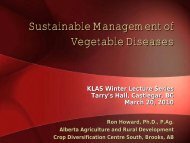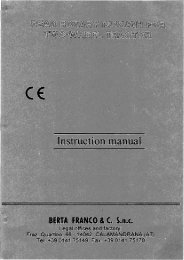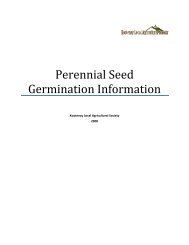Dirt: The Erosion of Civilizations - Kootenay Local Agricultural Society
Dirt: The Erosion of Civilizations - Kootenay Local Agricultural Society
Dirt: The Erosion of Civilizations - Kootenay Local Agricultural Society
You also want an ePaper? Increase the reach of your titles
YUMPU automatically turns print PDFs into web optimized ePapers that Google loves.
2<br />
Yet what is dirt? We try to keep it out <strong>of</strong> sight, out <strong>of</strong> mind, and outside.<br />
We spit on it, denigrate it, and kick it <strong>of</strong>f <strong>of</strong> our shoes. But in the end,<br />
what’s more important? Everything comes from it, and everything returns<br />
to it. If that doesn’t earn dirt a little respect, consider how pr<strong>of</strong>oundly soil<br />
fertility and soil erosion shaped the course <strong>of</strong> history.<br />
At the dawn <strong>of</strong> agricultural civilizations, the 98 percent <strong>of</strong> people who<br />
worked the land supported a small ruling class that oversaw the distribution<br />
<strong>of</strong> food and resources. Today, the less than 1 percent <strong>of</strong> the U.S. population<br />
still working the land feeds the rest <strong>of</strong> us. Although most people<br />
realize how dependent we are on this small cadre <strong>of</strong> modern farmers, few<br />
recognize the fundamental importance <strong>of</strong> how we treat our dirt for securing<br />
the future <strong>of</strong> our civilization.<br />
Many ancient civilizations indirectly mined soil to fuel their growth as<br />
agricultural practices accelerated soil erosion well beyond the pace <strong>of</strong> soil<br />
production. Some figured out how to reinvest in their land and maintain<br />
their soil. All depended on an adequate supply <strong>of</strong> fertile dirt. Despite<br />
recognition <strong>of</strong> the importance <strong>of</strong> enhancing soil fertility, soil loss contributed<br />
to the demise <strong>of</strong> societies from the first agricultural civilizations to<br />
the ancient Greeks and Romans, and later helped spur the rise <strong>of</strong> European<br />
colonialism and the American push westward across North America.<br />
Such problems are not just ancient history. That soil abuse remains a<br />
threat to modern society is clear from the plight <strong>of</strong> environmental refugees<br />
driven from the southern plains’ Dust Bowl in the 1930s, the African Sahel<br />
in the 1970s, and across the Amazon basin today. While the world’s population<br />
keeps growing, the amount <strong>of</strong> productive farmland began declining<br />
in the 1970s and the supply <strong>of</strong> cheap fossil fuels used to make synthetic fertilizers<br />
will run out later this century. Unless more immediate disasters do<br />
us in, how we address the twin problems <strong>of</strong> soil degradation and accelerated<br />
erosion will eventually determine the fate <strong>of</strong> modern civilization.<br />
In exploring the fundamental role <strong>of</strong> soil in human history, the key lesson<br />
is as simple as it is clear: modern society risks repeating mistakes that<br />
hastened the demise <strong>of</strong> past civilizations. Mortgaging our grandchildren’s<br />
future by consuming soil faster than it forms, we face the dilemma that<br />
sometimes the slowest changes prove most difficult to stop.<br />
For most <strong>of</strong> recorded history, soil occupied a central place in human cultures.<br />
Some <strong>of</strong> the earliest books were agricultural manuals that passed on<br />
knowledge <strong>of</strong> soils and farming methods. <strong>The</strong> first <strong>of</strong> Aristotle’s fundamental<br />
elements <strong>of</strong> earth, air, fire, and water, soil is the root <strong>of</strong> our existence,<br />
essential to life on earth. But we treat it as a cheap industrial com-<br />
good old dirt






